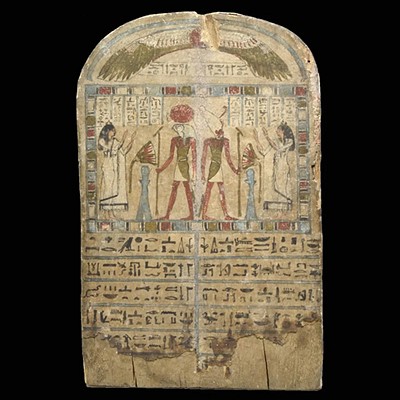2nd C. Roman Imperial Actor's Mask of Silenus
Lot 53a
About Seller
Artemis Fine Arts
686 S Taylor Ave, Ste 106
Louisville, CO 80027
United States
Selling antiquities, ancient and ethnographic art online since 1993, Artemis Gallery specializes in Classical Antiquities (Egyptian, Greek, Roman, Near Eastern), Asian, Pre-Columbian, African / Tribal / Oceanographic art. Our extensive inventory includes pottery, stone, metal, wood, glass and textil...Read more
Categories
Estimate:
$3,000 - $5,000
Absentee vs Live bid
Two ways to bid:
- Leave a max absentee bid and the platform will bid on your behalf up to your maximum bid during the live auction.
- Bid live during the auction and your bids will be submitted real-time to the auctioneer.
Bid Increments
| Price | Bid Increment |
|---|---|
| $0 | $25 |
| $300 | $50 |
| $1,000 | $100 |
| $2,000 | $250 |
| $5,000 | $500 |
| $10,000 | $1,000 |
| $20,000 | $2,500 |
| $50,000 | $5,000 |
| $100,000 | $10,000 |
| $200,000 | $20,000 |
About Auction
By Artemis Fine Arts
Nov 16, 2023
Set Reminder
2023-11-16 10:00:00
2023-11-16 10:00:00
America/New_York
Bidsquare
Bidsquare : Exceptional Antiquities, Ethnographic, Fine Art
https://www.bidsquare.com/auctions/artemis-gallery/exceptional-antiquities-ethnographic-fine-art-14161
Museum-worthy examples of classical antiquities (Egyptian, Greek, Roman, Near Eastern), Viking, Far East / Asian, Pre-Columbian, African / Tribal, Oceanic, Native American, Spanish Colonial, Nautical, Fossils, Ancient Jewelry, Fine / Visual Arts, so much more! Artemis Fine Arts info@artemisfinearts.com
Museum-worthy examples of classical antiquities (Egyptian, Greek, Roman, Near Eastern), Viking, Far East / Asian, Pre-Columbian, African / Tribal, Oceanic, Native American, Spanish Colonial, Nautical, Fossils, Ancient Jewelry, Fine / Visual Arts, so much more! Artemis Fine Arts info@artemisfinearts.com
- Lot Description
Roman, Imperial Period, ca. 2nd to 4th century CE. A fabulous mold-formed pottery actor's mask likely used in a tragic rather than a comedic scene. The visage depicts an aged face with a flowing beard, a bulbous nose, cupped ears with a single perforation each, round eyes beneath furrowed brows and grape bunches, and a characteristic gaping mouth, all colored with a pale-orange slip. The countenance most likely represents Silenus, a tutor and follower of Bacchus (Greek Dionysus) who is the deity of wine-making and drunkenness. Full-size masks like this example are extremely rare, making this an exceptional piece of theatrical art! Custom museum-quality display stand included. Size: 8.25" W x 10.5" H (21 cm x 26.7 cm); 13.125" H (33.3 cm) on included custom stand.
Satyrs originated in Greek mythology but were also favored by the Romans. Their goatlike features were associated with Bacchus (Greek Dionysos) and his fondness for wine and pleasures of the flesh. See another Roman satyr mask- the Lion of Chaeronea - at the Capitoline Museums of Rome.
Please note that this piece is a dropship item, meaning that it will be shipping from the consignor's location. All information regarding condition, size, stone identification, and metal content have been provided by the consignor.
Provenance: Fortuna Fine Art, New York collection acquired before 2010
All items legal to buy/sell under U.S. Statute covering cultural patrimony Code 2600, CHAPTER 14, and are guaranteed to be as described or your money back.
A Certificate of Authenticity will accompany all winning bids.
We ship worldwide and handle all shipping in-house for your convenience.
#182428Mask repaired from several large pieces with restoration to roughly half of the mask, mostly from the nose up. Surface wear commensurate with age, small chips to peripheries, ears, and beard, with some fading to finer details, and some fading to pigmentation. Light earthen and nice mineral deposits throughout unrestored areas.Condition
- Shipping Info
-
All shipping is handled in-house for your convenience. Your invoice from Artemis Gallery will include shipping calculation instructions. If in doubt, please inquire BEFORE bidding for estimated shipping costs for individual items.
-
- Buyer's Premium



 EUR
EUR CAD
CAD AUD
AUD GBP
GBP MXN
MXN HKD
HKD CNY
CNY MYR
MYR SEK
SEK SGD
SGD CHF
CHF THB
THB














